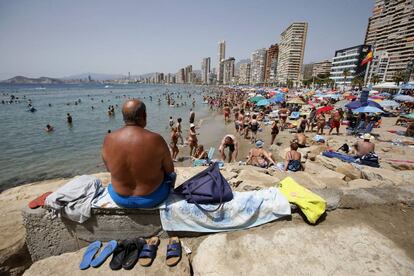Despite devalued post-Brexit pound, British visitor numbers to Spanish hotels up 15%
Hotels enjoy bumper July, having put prices up more than 6% from last year


The British may have voted to leave Europe, weakening their pound in the process, but Brexit hasn’t dented their fondness for Spanish holidays. In July, Spain’s hotels reported a 15% increase in arrivals from the United Kingdom compared to the previous year, according to the latest National Statistics Institute (INE) figures. The United Kingdom remains, by a long way, the main source of visitors to Spain, occupying 27.4% of hotel rooms.
Once again, Spain’s tourism sector is readying itself for a record number of arrivals this summer, boosted for the sixth year running by ongoing security fears in other Mediterranean destinations such as Tunisia, Egypt and Turkey.
The increase in hotel reservations has been matched by longer stays and higher prices, says the INE
The anticipated summer boom follows a record number of arrivals between January and April of this year: some 18.1 million, up 13% on the same period for 2015. “The outlook is spectacular. Failing a catastrophe or some major security issue, we’ll beat last year’s record easily,” says Ricard Santomà, dean of the Tourism faculty at Barcelona’s Universidad Ramón Llull, adding that many airlines have lowered ticket prices to reflect the fall in oil prices.
Next week, the INE will publish figures on the total number of visitors to Spain in July, taking into account campsites, apartment sub-lets, and holiday homes.
The leap in UK visitor numbers for this year needs to be seen in the context of the pound’s depreciation in the wake of the Brexit vote on June 23, says the INE. The British are not alone in choosing Spain for their summer holidays this year: there has been a 4.1% increase in visitors from Germany; an 8.8% hike from France; 3.8% from the Netherlands, and 3.2% from Italy. The overall increase for July in hotel stays is 7.4% compared to last year, matched by a 6.3% increase in revenue per room, up to €93.2%.
Despite the increased popularity of renting apartments through sites like Airbnb or home-swapping, Spain’s hotels have thrived in recent years, registering one record after another. In the first six months of 2016, overnight stays increased by 8.9% on the previous year.
The leap in UK visitor numbers for this year needs to be seen in the context of the pound’s depreciation in the wake of the Brexit vote
In short, the hotel sector has enjoyed a good July: the increase in hotel reservations has been matched by longer stays and higher prices, says the INE.
Four-star hotels have made the most money from their rooms, registering an 8.6% increase on an average €102.40 overnight stay. Two-star hotels have put their prices up by just 4.4% to €62.10. Top of the range five-star hotels, which cost around €208.40 a night, raised their prices by 5.8% on those for 2015.
Spain has the most competitive tourism industry in the world, a global study by the World Economic Forum (WEF) has found.
English version by Nick Lyne.
Tu suscripción se está usando en otro dispositivo
¿Quieres añadir otro usuario a tu suscripción?
Si continúas leyendo en este dispositivo, no se podrá leer en el otro.
FlechaTu suscripción se está usando en otro dispositivo y solo puedes acceder a EL PAÍS desde un dispositivo a la vez.
Si quieres compartir tu cuenta, cambia tu suscripción a la modalidad Premium, así podrás añadir otro usuario. Cada uno accederá con su propia cuenta de email, lo que os permitirá personalizar vuestra experiencia en EL PAÍS.
¿Tienes una suscripción de empresa? Accede aquí para contratar más cuentas.
En el caso de no saber quién está usando tu cuenta, te recomendamos cambiar tu contraseña aquí.
Si decides continuar compartiendo tu cuenta, este mensaje se mostrará en tu dispositivo y en el de la otra persona que está usando tu cuenta de forma indefinida, afectando a tu experiencia de lectura. Puedes consultar aquí los términos y condiciones de la suscripción digital.








































